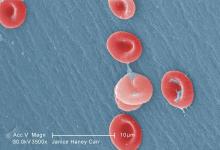Substantial percentages of children with sickle cell disease are not receiving certain recommended vaccines on time or at all, found a study examining receipt of pneumococcal and meningococcal vaccines among children born in Michigan.
Although these children were more likely to be up-to-date on their pneumococcal vaccines than others their age without sickle cell disease (SCD), nearly one-third had not received all their pneumococcal vaccines by 36 months old. These children are at higher risk of meningococcal and invasive pneumococcal disease because they lack normal spleen function.
The Centers for Disease Control and Prevention’s Advisory Committee on Immunization Practices (ACIP) child vaccination schedule includes complex recommendations for these two vaccines in children with certain high-risk conditions, including SCD, noted Abram L. Wagner, PhD, MPH, of the University of Michigan, Ann Arbor, and his associates.ACIP has recommended since February 2010 that all children receive the 13-valent pneumococcal conjugate vaccine (PCV13), which replaced the 7-valent pneumococcal conjugate vaccine (PCV7) that had been recommended since October 2000.
But ACIP also recommends that children with SCD receive two doses of the 23-valent polysaccharide vaccine (PPV23), starting at 2 years old. These children also should receive a PCV13 dose before age 18 years, even if they received the full PCV7 vaccine series.
“By directly including SCD status in a child’s immunization record, an immunization information system could use a specialized algorithm to indicate to healthcare providers which vaccines should be given to a patient with SCD, which may differ from a typical patient,” Dr. Wagner and his colleagues wrote in The Journal of Pediatrics.
“Educational campaigns targeted to parents of these children and their providers could also help advance the importance of vaccination, particularly as more vaccines enter the market, many of which may be highly recommended for children with SCD,” they said.


